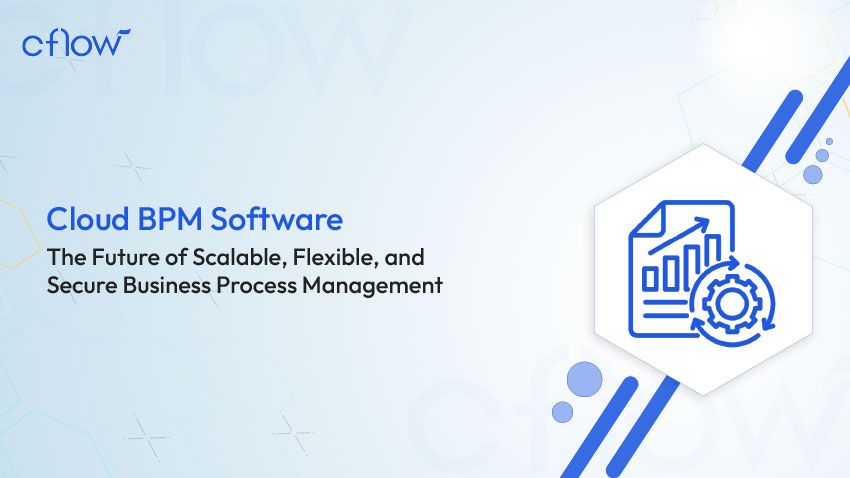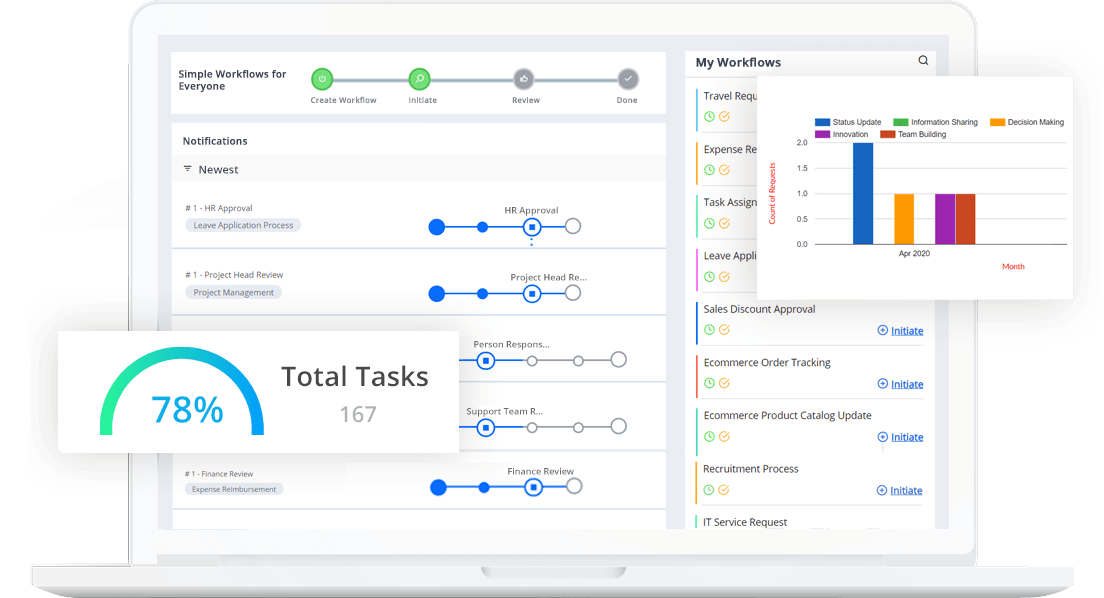Cloud BPM Software: The Future of Scalable, Flexible, and Secure Business Process Management

Key takeaways
- Cloud BPM solutions allow businesses to manage processes with increased agility and scalability, improving efficiency and reducing costs.
- Cloud bpm software offers real-time collaboration, streamlined operations, and seamless access from anywhere, driving productivity and innovation.
- Adopting cloud-based BPM software enhances business security and data management while offering integration with existing systems.
- Cloud bpm improves collaboration and decision-making, providing businesses with the flexibility to adapt and scale quickly to changing market needs.
As businesses continue to grow and adapt in an ever-changing digital landscape, adopting modern technology to manage business processes is essential for staying competitive. Cloud BPM (Business Process Management) software has emerged as a game-changer for organizations looking to streamline operations, enhance productivity, and drive efficiency.
Cloud BPM solutions are designed to automate and optimize workflows, providing businesses with the flexibility to adapt to new challenges and scale their operations without the constraints of traditional on-premise systems.
Unlike traditional BPM, which is often limited by infrastructure, cloud BPM software offers a more agile approach to process management. It ensures that businesses can access critical systems and data from anywhere, at any time, making it an ideal solution for remote teams and global operations. Furthermore, cloud-based solutions provide low-maintenance options with regular updates and robust security features.
In this blog, we will explore cloud bpm software in-depth, from its benefits and key features to the transition process from traditional systems. By the end of this article, you will understand why cloud BPM is an essential tool for businesses aiming to stay ahead in the digital age and how it can optimize your processes for long-term success.
Table of Contents
What is Cloud BPM?
Cloud BPM (Business Process Management) is a set of technologies designed to automate and optimize business processes by using cloud-based platforms.
These systems help businesses design, model, and automate workflows, ensuring seamless collaboration across departments, better visibility into performance, and real-time data analysis. Cloud BPM allows businesses to be more agile by offering scalability, accessibility, and cost-effectiveness compared to traditional on-premise BPM solutions.
Cloud BPM software typically includes a range of tools such as process modeling, task automation, reporting, and analytics. These tools help organizations streamline workflows, reduce errors, enhance collaboration, and improve decision-making. The main advantage of cloud BPM is that it allows businesses to access their systems from anywhere, ensuring that team members can work efficiently regardless of their location.
The cloud-based nature of this technology also makes it easier to integrate with existing systems and scale as the business grows. With cloud-based BPM software, companies can drive continuous improvement, automate routine tasks, and ensure a more responsive, data-driven organization.
Traditional vs. Cloud BPM
| Feature | Traditional BPM | Cloud BPM |
|---|---|---|
| Deployment | Requires on-premise infrastructure and resources | Hosted in the cloud, accessible from anywhere |
| Maintenance | Regular maintenance is needed; costly upgrades | Managed by the vendor with automatic updates |
| Scalability | Limited by hardware and infrastructure constraints | Easily scalable based on business needs |
Why Cloud BPM Solutions?
Cloud BPM solutions offer several advantages over traditional on-premise BPM systems, making them a powerful tool for businesses. From scalability to enhanced security, these solutions enable companies to streamline processes, improve collaboration, and adapt to market changes effectively. Here’s why adopting Cloud BPM software is crucial for your business –
1. Scalability and Low Maintenance
Cloud BPM software is inherently scalable, allowing businesses to expand their workflows and processes without worrying about infrastructure limitations. As businesses grow, the system can seamlessly handle increased demands, enabling the efficient scaling of operations.
2. Accessible Anywhere, at Any Time
Cloud BPM allows employees, teams, and departments across multiple locations to access business processes and data from any device. This provides significant flexibility for remote teams and ensures that employees can work from anywhere without being tied to a physical office.
3. Agility and Connectivity
Cloud BPM solutions are designed to provide businesses with the agility they need to quickly adapt to market shifts and business changes. These platforms allow seamless integration with existing systems, ensuring smooth data flow across different applications. With real-time updates and instant access to accurate information, businesses can remain nimble and responsive.
4. Security
Data security is a critical concern for businesses today, and cloud BPM solutions offer robust encryption and secure cloud infrastructure to protect sensitive information. These systems comply with industry standards and regulations, ensuring that your business remains secure and meets compliance requirements. With reliable backups, disaster recovery plans, and regular security audits, cloud BPM platforms provide the highest levels of data protection.
Where Can a Cloud BPM Be Used?
Cloud BPM software is versatile and can be applied across various departments within a business to enhance efficiency, automation, and collaboration. By streamlining processes, it helps organizations achieve faster turnaround times, reduce errors, and improve overall productivity. Below are key areas where cloud BPM can be particularly impactful:
1. In Human Resources
Cloud BPM can significantly optimize HR processes such as onboarding, performance evaluations, leave requests, and payroll management. By automating these tasks, HR teams can eliminate manual data entry and ensure faster, more efficient handling of employee information.
2. In Sales and Marketing
With cloud BPM software, sales and marketing teams can automate time-consuming tasks like lead generation, follow-ups, and campaign management. By automating workflows, sales representatives can focus on high-value activities such as nurturing relationships and closing deals.
3. In Customer Service
Cloud BPM software helps customer service teams streamline their workflows by automating ticketing systems, managing customer inquiries, and tracking support requests in a centralized platform. This not only reduces the time spent on manual tasks but also improves response times and customer satisfaction.
Reasons Why You Need Cloud BPM Software for Your Business
Cloud BPM software offers a wide array of benefits for businesses, enabling greater efficiency, collaboration, and scalability. By adopting cloud-based BPM solutions, companies can improve their operations while cutting costs and enhancing security. Below are key reasons why cloud BPM software is essential for your business:
1. Access It Anywhere and Anytime
Cloud BPM software provides flexibility by allowing your team to access and manage processes from any location. This ensures operational continuity, even when employees are working remotely or across multiple locations, facilitating smoother workflow management and uninterrupted operations.
2. Scalability and Flexibility
As your business grows, your processes need to scale with it. Cloud BPM software offers the flexibility to adapt quickly to changing demands. It allows businesses to easily expand their workflows, automate additional tasks, and manage larger volumes of data without the need for extensive infrastructure investments.
3. Cost-Effectiveness
By eliminating the need for on-premise infrastructure and reducing maintenance costs, cloud BPM is a more affordable solution compared to traditional BPM systems. The cloud-based model eliminates hardware costs and allows businesses to only pay for the services they need, making it an ideal choice for companies of all sizes.
4. Security
Cloud BPM solutions provide high-level security, including encryption and secure data storage, ensuring that your business data is well protected. With compliance with industry standards and regular security audits, cloud BPM ensures that your data remains safe from cyber threats and breaches.
5. Integration Capabilities
Cloud BPM platforms can seamlessly integrate with existing business software, ensuring smooth data flow across multiple systems. This integration reduces data silos, improves efficiency, and ensures that all systems are working in harmony to support business goals.
6. Data-Driven Insights
With real-time analytics and reporting capabilities, cloud BPM software enables businesses to gather actionable insights. These insights allow companies to make informed decisions, optimize processes, and continuously improve workflows, leading to better performance and ROI.
7. Reduced Errors
Automation of repetitive tasks and workflows reduces the risk of human errors, improving accuracy and consistency across operations. This also frees up employees to focus on more strategic tasks, which can enhance productivity and further reduce operational inefficiencies.
8. Enhanced Collaboration
Cloud BPM enhances collaboration by enabling seamless communication across teams, regardless of their location. With real-time updates and integrated platforms, teams can collaborate more effectively, improving coordination, reducing bottlenecks, and boosting overall productivity.
Key Features of Cloud BPM Software
Cloud BPM software comes equipped with a variety of powerful features designed to streamline business operations, automate repetitive tasks, and enhance collaboration across departments. These features enable businesses to achieve higher levels of efficiency, scalability, and accuracy, ensuring smoother workflows and better overall performance. Below are the key features that make cloud BPM software a valuable tool for modern business management –
1. Process Modeling
Cloud BPM software allows businesses to visualize their processes, identifying inefficiencies and aligning them with strategic goals. This graphical representation of workflows enables businesses to spot areas for improvement and optimize processes accordingly.
2. Automation and Task Management
Cloud BPM software automates repetitive tasks, streamlining workflows and eliminating manual intervention. By automating tasks such as approvals and notifications, businesses can increase productivity and ensure faster, error-free execution of processes.
3. Workflow Tracking and Reporting
With real-time tracking and reporting features, businesses can monitor the performance of their workflows, ensuring that processes are running smoothly. These tools provide insights into bottlenecks and performance gaps, enabling data-driven decisions to optimize operations.
4. Seamless Integrations
Cloud BPM solutions integrate with existing business applications, ensuring that data flows seamlessly across different systems. These integrations help businesses eliminate silos, improve efficiency, and maintain consistency across all operations.
5. Secure Data Storage
Cloud BPM software provides secure, encrypted storage for business data, ensuring privacy and regulatory compliance. With cloud-based solutions, businesses can store their data securely while maintaining easy access and backup for disaster recovery.
How Does Cloud BPM Work?
Cloud BPM software works by automating business processes, streamlining workflows, and enhancing collaboration across teams. It integrates seamlessly with existing systems, ensuring data flows effortlessly and processes are managed efficiently. Below is a breakdown of how cloud BPM operates across various stages to improve business efficiency –
1. Process Mapping
Using cloud-based platforms, businesses can define and map their processes visually. This allows them to identify inefficiencies, streamline workflows, and optimize processes to align with business objectives.
2. Automation
Cloud BPM enables the automation of tasks and workflows, reducing manual intervention. Automated tasks such as approvals, notifications, and task assignments enhance speed, accuracy, and consistency, ensuring seamless operations.
3. Integration
Cloud BPM integrates with existing business systems to ensure smooth data flow between departments and platforms. This connectivity allows businesses to streamline processes, reduce redundancy, and optimize workflows across the organization.
4. Monitoring and Optimization
Cloud BPM solutions provide continuous monitoring, allowing businesses to track performance and make ongoing optimizations. By using real-time analytics and performance metrics, companies can continuously improve workflows to ensure maximum efficiency.
End-to-end workflow automation
Build fully-customizable, no code process workflows in a jiffy.
How to Switch to Cloud BPM Software
Switching to cloud BPM software can be a game-changer for your organization, but the process requires careful planning and execution. Migrating from legacy systems to cloud-based BPM solutions involves a strategic approach to ensure smooth adoption and minimal disruption. Here are the key steps to help guide your organization through the transition process:
1. Transition Departments in Phases
To ensure a smooth transition, move departments to cloud BPM gradually. Start with areas that will benefit the most from automation and streamline workflows, then expand as your team adapts.
2. Over-Communicate
Clear communication is key during the transition. Ensure that all stakeholders understand the benefits of cloud BPM software and are aware of the steps involved. Regular updates and open channels for feedback will help minimize resistance.
3. Overtrain
Providing thorough training for employees is essential to ensure the smooth adoption of cloud BPM systems. Overtrain staff on the new platform to help them feel confident and capable of using the software effectively from day one.
4. Prepare for Integrations
Ensure that your IT infrastructure is prepared for integrating cloud BPM with existing business systems. This will avoid disruptions and ensure seamless data flow across platforms.
5. Collect Data from Your Legacy BPM Platform
Before making the switch, collect critical data from your legacy BPM platform. This ensures that important information isn’t lost during the transition and that your team can continue working seamlessly with the data they need.
Cflow – The Best Cloud BPM Software
Cflow is a leading cloud BPM software designed to streamline workflows, enhance collaboration, and optimize business processes for organizations of all sizes. With its intuitive, user-friendly interface, Cflow empowers businesses to automate routine tasks, reduce manual errors, and boost overall efficiency. Whether it’s process modeling, task management, or real-time reporting, Cflow provides a comprehensive suite of tools to help businesses achieve their digital transformation goals.
Cflow offers –
Feature 1: Visual Workflow Builder
Cflow’s intuitive visual workflow builder allows businesses to design and automate their processes with ease, increasing efficiency and reducing errors.
Feature 2: Seamless Integrations
Cflow integrates with popular applications, ensuring smooth data exchange and eliminating workflow silos.
Feature 3: Advanced Analytics and Reporting
Cflow’s real-time analytics provide actionable insights, helping businesses measure ROI and continuously improve their processes.
Feature 4: Mobile Accessibility
Cflow’s mobile app allows businesses to manage workflows from anywhere, improving flexibility and enhancing team collaboration.
Feature 5: Secure Data Storage
Cflow ensures your business data is stored securely in the cloud, with encryption and compliance with industry standards.
Final Thoughts
Cloud BPM software is a crucial tool for businesses looking to streamline operations, enhance collaboration, and drive digital transformation. By adopting a cloud BPM solution like Cflow, companies can automate processes, improve efficiency, and make data-driven decisions that foster growth and profitability.
Sign up for Cflow today and start your digital transformation journey to maximize ROI.
FAQs
- What is Cloud BPM?
Cloud BPM refers to business process management solutions hosted in the cloud, enabling businesses to automate and optimize workflows with scalability, flexibility, and security. - How Does Cloud Collaboration Benefit Businesses?
Cloud collaboration tools allow teams to access data, communicate in real-time, and collaborate seamlessly, driving productivity, innovation, and higher ROI. - How to Choose the Right Cloud Collaboration Tool?
When selecting a cloud collaboration tool, consider factors such as ease of use, scalability, security, integration capabilities, and cost to ensure it aligns with your business needs.
What should you do next?
Thanks for reading till the end. Here are 3 ways we can help you automate your business:

Do better workflow automation with Cflow
Create workflows with multiple steps, parallel reviewals. auto approvals, public forms, etc. to save time and cost.

Talk to a workflow expert
Get a 30-min. free consultation with our Workflow expert to optimize your daily tasks.

Get smarter with our workflow resources
Explore our workflow automation blogs, ebooks, and other resources to master workflow automation.
What would you like to do next?
Automate your workflows with our Cflow experts.



